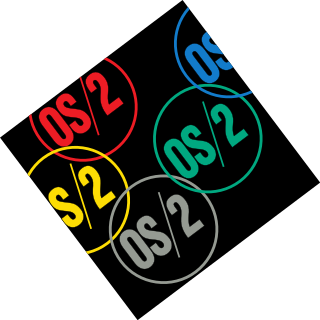A library is a collection of books or an institution lending books and providing information.
Contents
Library may also refer to:
A library is a collection of books or an institution lending books and providing information.
Library may also refer to:
Class, Classes, or The Class may refer to:
Mode may refer to:

OS/2 is a series of computer operating systems, initially created by Microsoft and IBM under the leadership of IBM software designer Ed Iacobucci. As a result of a feud between the two companies over how to position OS/2 relative to Microsoft's new Windows 3.1 operating environment, the two companies severed the relationship in 1992 and OS/2 development fell to IBM exclusively. The name stands for "Operating System/2", because it was introduced as part of the same generation change release as IBM's "Personal System/2 (PS/2)" line of second-generation personal computers. The first version of OS/2 was released in December 1987 and newer versions were released until December 2001.
Prism usually refers to:
A word is a unit of language.
Core or cores may refer to:
A computing platform, digital platform, or software platform is an environment in which software is executed. It may be the hardware or the operating system (OS), a web browser and associated application programming interfaces, or other underlying software, as long as the program code is executed using the services provided by the platform. Computing platforms have different abstraction levels, including a computer architecture, an OS, or runtime libraries. A computing platform is the stage on which computer programs can run.

In computer science, a library is a collection of non-volatile resources used by computer programs, often for software development. These may include configuration data, documentation, help data, message templates, pre-written code and subroutines, classes, values or type specifications. In IBM's OS/360 and its successors they are referred to as partitioned data sets.

The Internet Archive is an American digital library founded on May 10, 1996, and chaired by free information advocate Brewster Kahle. It provides free access to collections of digitized materials including websites, software applications, music, audiovisual and print materials. The Archive also advocates for a free and open Internet. As of January 1, 2024, the Internet Archive holds more than 41 million print materials, 8.4 million videos, 0.89 million software programs, 14.7 million audio files, 4.4 million images, 240,000 concerts, and over 735 billion web pages in its Wayback Machine. Its mission is to provide "universal access to all knowledge".
Joe or JOE may refer to:
G5, G.V, G.5 or G-5 may refer to:
Alice may refer to:
Power may refer to:
Object may refer to:

"Daisy Bell (Bicycle Built for Two)" is a song written in 1892 by British songwriter Harry Dacre with the well-known chorus "Daisy, Daisy / Give me your answer, do. / I'm half crazy / all for the love of you", ending with the words "a bicycle built for two". The song is said to have been inspired by Daisy Greville, Countess of Warwick, one of the many mistresses of King Edward VII. It is the earliest song sung using computer speech synthesis by the IBM 704 in 1961, a feat that was referenced in the film 2001: A Space Odyssey (1968).
Choice consists of the mental process of thinking involved with the process of judging the merits of multiple options and selecting one of them for action.

In conservation, library and archival science, preservation is a set of preventive conservation activities aimed at prolonging the life of a record, book, or object while making as few changes as possible. Preservation activities vary widely and may include monitoring the condition of items, maintaining the temperature and humidity in collection storage areas, writing a plan in case of emergencies, digitizing items, writing relevant metadata, and increasing accessibility. Preservation, in this definition, is practiced in a library or an archive by a conservator, librarian, archivist, or other professional when they perceive a collection or record is in need of maintenance.
A system is a set of entities, real or abstract, comprising a whole.

Carol McKinney Highsmith is an American photographer, author, and publisher who has photographed in all the states of the United States as well as the District of Columbia and Puerto Rico. She photographs the entire American vista in all fifty U.S. states as a record of the early 21st century.

The Thomas J. Watson Library is the main research library of the Metropolitan Museum of Art, and supports the research activities of the museum staff, as well as outside researchers. It is located in the Met's main building, The Met Fifth Avenue.